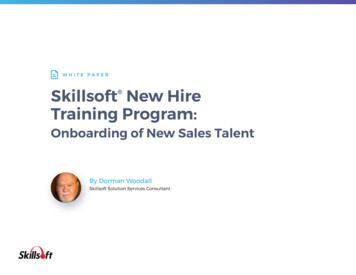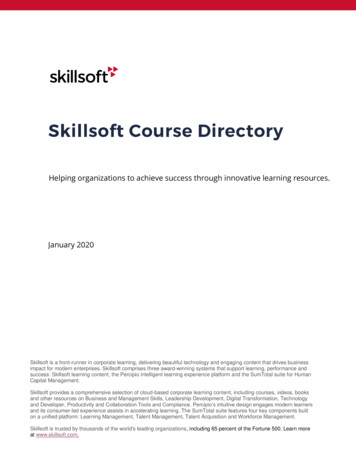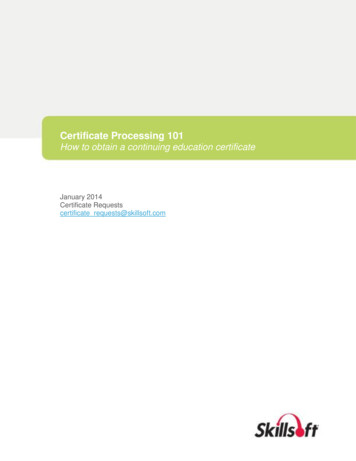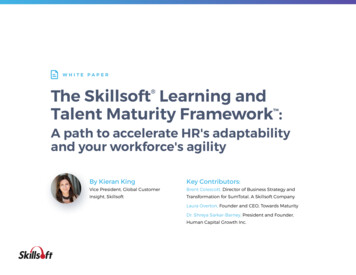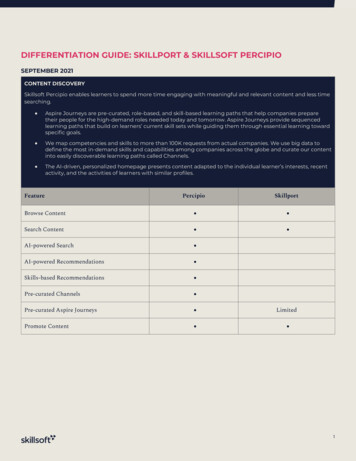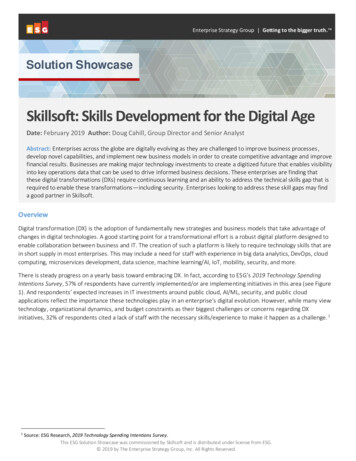
Transcription
Enterprise Strategy Group Getting to the bigger truth. Solution ShowcaseSkillsoft: Skills Development for the Digital AgeDate: February 2019 Author: Doug Cahill, Group Director and Senior AnalystAbstract: Enterprises across the globe are digitally evolving as they are challenged to improve business processes,develop novel capabilities, and implement new business models in order to create competitive advantage and improvefinancial results. Businesses are making major technology investments to create a digitized future that enables visibilityinto key operations data that can be used to drive informed business decisions. These enterprises are finding thatthese digital transformations (DXs) require continuous learning and an ability to address the technical skills gap that isrequired to enable these transformations—including security. Enterprises looking to address these skill gaps may finda good partner in Skillsoft.OverviewDigital transformation (DX) is the adoption of fundamentally new strategies and business models that take advantage ofchanges in digital technologies. A good starting point for a transformational effort is a robust digital platform designed toenable collaboration between business and IT. The creation of such a platform is likely to require technology skills that arein short supply in most enterprises. This may include a need for staff with experience in big data analytics, DevOps, cloudcomputing, microservices development, data science, machine learning/AI, IoT, mobility, security, and more.There is steady progress on a yearly basis toward embracing DX. In fact, according to ESG’s 2019 Technology SpendingIntentions Survey, 57% of respondents have currently implemented/or are implementing initiatives in this area (see Figure1). And respondents’ expected increases in IT investments around public cloud, AI/ML, security, and public cloudapplications reflect the importance these technologies play in an enterprise’s digital evolution. However, while many viewtechnology, organizational dynamics, and budget constraints as their biggest challenges or concerns regarding DXinitiatives, 32% of respondents cited a lack of staff with the necessary skills/experience to make it happen as a challenge. 11Source: ESG Research, 2019 Technology Spending Intentions Survey.This ESG Solution Showcase was commissioned by Skillsoft and is distributed under license from ESG. 2019 by The Enterprise Strategy Group, Inc. All Rights Reserved.
Solution Showcase: Skillsoft: Skills Development for the Digital Age2Figure 1. Status of Digital Transformation InitiativesSource: Enterprise Strategy GroupThe Skills Required to Enable Enterprises to Digitally Transform Are in Short SupplyThe business agility of many enterprises is dependent on the responsiveness of their IT organizations and their ability toembrace DX. This requires staff with the right skills to do the required work—skills for which there is often a shortage oftrained personnel (see Figure 2).2 Therefore, the need to provide skills training in areas such as security, IT architecture,AI/ML, etc., continues to grow as an increasing number of enterprises require the creation and ongoing support of digitalplatforms. This enables them to embrace a world in which timely access to data can be the difference between theirsuccess and failure. Common across most of these technology disciplines is the requirement for security, especially as itrelates to securing and protecting applications, infrastructure, and data.Figure 2. Top Six Areas for Skill Shortages in IT OrganizationsSource: Enterprise Strategy Group2Ibid. 2019 by The Enterprise Strategy Group, Inc. All Rights Reserved.
Solution Showcase: Skillsoft: Skills Development for the Digital Age3With this in mind, organizations have some critical security skills matters to consider: Security skills are required within IT organizations to enable and protect DX building blocks. Yet 53% of respondents toESG’s 2019 Technology Spending Intentions Survey report that there is a problematic shortage of existing securityskills within their IT organizations. 3 This shortage of skilled security staff is directly impacting the security posture ofmany enterprises. In ESG’s most recent The Life and Times of Cybersecurity Professionals survey, 31% of respondentsstated that one of the three biggest contributors to security events was a lack of security skills and/or staff. In fact,96% of those security professionals agree or strongly agree that they must keep up with their skills or theorganizations they work for are at a significant disadvantage against today’s adversaries. 4In that same survey, it is clear that enterprises are getting the message, as 50% of respondents reported that theiremployer increased training for their security and/or IT staff, and 46% said their organization increased the size of itssecurity staff. Of note, 76% of security professionals viewed attending security training courses as the most effectivemethod for increasing knowledge, skills, and abilities. However, there is more to be done, as 62% stated that theiremployer does not do enough in regard to security training in order to keep up with business and IT risk.5 Given thatsecurity is a key component of many DX initiatives, continuous skill development is an absolute requirement. Cloud-based security requires a unique set of skills. As enterprises continue to evolve digitally, an ever-increasingnumber of workloads and data are migrating to the public cloud. However, on-premises data security programs aremuch more mature than cloud, and data loss across cloud services is common. ESG has found that to address thischallenge, 60% of organizations have hired a cloud security architect, and another 23% are actively hiring for thisposition or plan to establish this position within 12-24 months.6 This new role within IT organizations reflects theunique skills required to address cloud-based security—a role that has emerged with broad responsibilities andinfluence. Security risk management staffing needs to be increased. In many enterprises, the ability to provide a detailedunderstanding of security risks and a plan for how they are managed is a board-level requirement. However, aneffective security risk management program requires personnel with a variety of skills that enable them toelectronically inventory assets, assess risk, plan and deploy countermeasures, design and implement businesscontinuity plans, test for vulnerabilities, monitor for threats, manage vulnerabilities, detect attacks, and respond. Asenterprises embrace DX, the same security risk management practices can extend to third-party organizations, andESG research shows that 44% of third-party risk management (TPRM) security audit processes lack sufficientresources.7 So too, the requirement to comply with various regulations is driving the need for new roles with theappropriate security skills/training. Just as the move to the cloud resulted in the creation of the cloud securityarchitect role, so too the need to comply with GDPR has driven the need for data protection officers (DPO). ESGsurvey results show that 35% of enterprises have a dedicated DPO, while another 23% are actively hiring for thisposition or plan to establish this position within 12-24 months. 83Source: Ibid.Source: ESG/ISSA Research Report, The Life and Times of Cybersecurity Professionals, November 2017.5 Source: Ibid.6 Source: ESG Master Survey Results, Trends in Cloud Data Security, January 2019.7 Source: ESG Research, Cyber Risk Management, November 2018.8 Source: ESG Master Survey Results, 2018 Data Protection Landscape Survey, November 2018.4 2019 by The Enterprise Strategy Group, Inc. All Rights Reserved.
Solution Showcase: Skillsoft: Skills Development for the Digital Age4ESG research has found that the security skills shortage is a perennial challenge. Security skills have been the most-citedskills deficit in ESG’s annual spending intentions surveys for the past four years, with the percentage of organizationsreporting a problematic security skills gap increasing every year from 2015 to 2019. However, this security skills shortagerepresents both a challenge and an opportunity for the industry. Fortunately, there are vendors that are working hard toaddress the problem.Enter SkillsoftSkillsoft aligns with today’s need for security professionals who can support digital transformation initiatives.Skillsoft is headquartered in Dublin, Ireland with their US headquarters in Nashua, NH. The company’s mission is to preparethe global workforce to leverage the building blocks of the modern digital economy, and its Technology and Developersolutions cover a range of focus areas, content, and consumption models that IT organizations can leverage to up-levelskills. These multimodal learning solutions reflect a growing investment in IT/developer learning and training content forDevOps, cloud, microservices, security, and data—key areas of skill development required to support DX initiatives.Skillsoft’s training resources include courses, videos, hands-on live practice labs, virtual mentoring, a large library of booksand audio-books, as well as certification prep exams and assessments. In total, this content can provide technicalprofessionals the skills/knowledge and certification training needed to support an enterprise’s DX initiatives whilecontinuing to do the jobs for which they were hired.Skillsoft’s learning model is designed to support people in their flow of work, where they can “Watch, Read, Listen andPractice.” Skillsoft believes this approach helps enterprises continually adapt in an age of digital disruption andtransformation. The model identifies a learning path for an “aspirational persona” that includes sequenced instruction,practice and application, and in-demand credentials. For example, if someone in the role of security technician aspires tobecome a cloud security architect, the Skillsoft model will first direct her to learn how to be a security administrator andthen a cloud security administrator, before pursuing the role of cloud security architect.Of note, Skillsoft provides coverage for 100 professional IT certification exams from leading software, hardware, cloud,and professional organizations, with a tracked pass rate of 90%. And its certification training includes 20 securitycertifications including: CISM, CCSP, CISSP, Foundations of Android and IOS Security, Cisco (CCNP or CCNA), and more.Given the current security skills gap discovered in ESG research, this benefit should be attractive for Skillsoft customers.The Bigger TruthEnterprises exist in a world in which timely access to data is crucial to making informed decisions. A world in which criticalbusiness and operational systems are increasingly connected to third-party organizations—systems that can also beaccessed remotely by customers, suppliers, partners, etc. This digital evolution is required if enterprises don’t want to findthemselves at a significant disadvantage to their competition.DevOps, the cloud, microservices development, data science, machine learning, and AI are key building blocks upon whichthese changes are built, with security as a common discipline across each of these areas. Staffing pressures for securityexperts will continue, as nearly half of security professionals report that they are solicited for new jobs by recruiters atleast once per week, and 14% state that they receive overtures regarding new opportunities five times per week or more.9Given the shortage of people with the skills required to support DX, it is not unreasonable for employees to expect theirorganization to prepare them for the new roles that DX will require. Increased and more expansive training around securityhas the potential to raise the overall maturity of an enterprise.9Source: ESG/ISSA Research Report, The Life and Times of Cybersecurity Professionals, November 2017. 2019 by The Enterprise Strategy Group, Inc. All Rights Reserved.
Solution Showcase: Skillsoft: Skills Development for the Digital Age5Forward-thinking organizations are getting more strategic about skills training for their employees. They understand thatthe knowledge required to enable digital transformation and maintain a digitally evolved enterprise requires ongoing andeasily available education. Skillsoft has a long history of successfully delivering just such training. In 2018, its customersconsumed 21M hours of learning content around the world, approximately 21% (4M hours) of which was related tosecurity skills training and certification. Moving forward, CISOs may find it worthwhile to provide access to Skillsoft’straining portfolio as part of their employee development programs.All trademark names are property of their respective companies. Information contained in this publication has been obtained by sources The Enterprise Strategy Group(ESG) considers to be reliable but is not warranted by ESG. This publication may contain opinions of ESG, which are subject to change. This publication is copyrighted byThe Enterprise Strategy Group, Inc. Any reproduction or redistribution of this publication, in whole or in part, whether in hard-copy format, electronically, or otherwise topersons not authorized to receive it, without the express consent of The Enterprise Strategy Group, Inc., is in violation of U.S. copyright law and will be subject to anaction for civil damages and, if applicable, criminal prosecution. Should you have any questions, please contact ESG Client Relations at 508.482.0188.Enterprise Strategy Group is an IT analyst, research, validation, and strategy firm that provides marketintelligence and actionable insight to the global IT community. 2019 by The Enterprise Strategy Group, Inc. All Rights Reserved.www.esg-global.com 2019 by The Enterprisecontact@esg-global.comStrategy Group, Inc. All Rights Reserved.P. 508.482.0188
Skillsoft's learning model is designed to support people in their flow of work, where they can "Watch, Read, Listen and Practice." Skillsoft believes this approach helps enterprises continually adapt in an age of digital disruption and transformation. The model identifies a learning path for an "aspirational persona" that includes .



